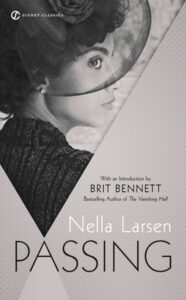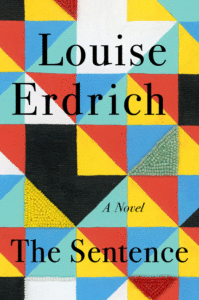
Our feast of fabulous reviews this week includes Carole V. Bell on Nella Larsen’s Passing, Megan O’Grady on Lily King’s Five Tuesdays in Winter, Ron Charles on Louise Erdrich’s The Sentence, Emma Levy on Emily Ratajkowski’s My Body, and Christian Lorentzen on Viet Thanh Nguyen’s The Committed.

“The one thing most people know about Nella Larsen’s Passing is that it explores a peculiar kind of deception—being born into one marginalized racial category and slipping into another, for privilege, security, or power. But the significance of Passing isn’t found in the surface facts but in the brilliance of its execution: the beauty of the writing, the close character study, and the intense psychological suspense … The contrast, parallels, and interplay between these two women is part of what makes Passing so beautifully constructed. Every choice is finely calibrated. Their interactions are polite, but Larsen has a way of making the simplest observation feel like a prelude to horror … Deftly juggling the psychological closeup and the bigger picture, Larsen dips into, contradicts, and complicates that worn image while also bringing to life Du Bois’ concept of double consciousness. Larsen shows how intimate choices are bound up in social forces while endowing her characters with indelible specificity. As her last published novel, that is quite a legacy.”
–Carole V. Bell on Nella Larsen’s Passing (NPR)
“The pursuit of desire—the hubris and folly of it, its links to our intellect and the tricky synchronicity of brain and heart—is King’s best subject … King reminds us of the revelations still to be found in plot and character, those elements of fiction that might be called old-fashioned if it weren’t for the fact that she, with her range and emotional precision, never makes them feel so. There is, it turns out, still much more to know about what living is all about, and the things that crack us open, geode-like, to reveal some hidden marvel within … King’s acuity with all that roils inside us often puts me in the mind of Tessa Hadley or Joan Silber, authors who shun ironic distance for forthright proximity, whose feminism is implicit, who could inscribe the contents of the human heart on the head of a pin … It’s clear from these stories that she’s never lost sight of how difficult it is to take oneself seriously when no one else really does. It’s one of the reasons I think of her as ‘a writer’s writer’—in the best sense, in the sense that we never doubt her belief in storytelling as our best chance at truth and its solaces … In our time of anxiety and isolation, King writes stories to curl up in, by which I mean they afford us something rarely celebrated in literature: comfort.”
–Megan O’Grady on Lily King’s Five Tuesdays in Winter (The New York Times Book Review)

“The coronavirus pandemic is still raging away and God knows we’ll be reading novels about it for years, but Louise Erdrich’s The Sentence may be the best one we ever get. Neither a grim rehashing of the lockdown nor an apocalyptic exaggeration of the virus, her book offers the kind of fresh reflection only time can facilitate, and yet it’s so current the ink feels wet … Such is the mystery of Erdrich’s work, and The Sentence is among her most magical novels, switching tones with the felicity of a mockingbird … The great arc of [the] first 30 pages—zany body-snatching! harrowing prison ordeal! opposites-attract rom-com!—could have provided all the material needed for a whole novel, but Erdrich has something else in mind for The Sentence: This is a ghost story—though not like any I’ve read before. The novel’s ectoplasm hovers between the realms of historical horror and cultural comedy … Moving at its own peculiar rhythm with a scope that feels somehow both cloistered and expansive, The Sentence captures a traumatic year in the history of a nation struggling to appreciate its own diversity.”
–Ron Charles on Louise Erdrich’s The Sentence (The Washington Post)
“My Body is meant to signal a shift in Ratajkowski’s public persona, and to a certain extent, it does. She no longer seems quite as interested in convincing the world that there is political virtue in being sexy online … Yet her gaze is provincial, rarely extending past the confines of her own skin even when she is critiquing systemic issues … confessionals can come across as opportunistic and hollow. At their worst, Ratajkowski’s essays belong in this genre. She supplies details that seem designed to evoke sympathy, but read as rather strange and tone-deaf … Ratajkowski has lived an extraordinary life, and some of these stories demand to be told … But an extraordinary life does not necessarily birth extraordinary insights, and banality is what My Body ultimately suffers from … The mere ability to recognize the rottenness of patriarchy and capitalism also does not exempt you from perpetuating these constructs. Ratajkowski’s is a reassuring system of logic because it ultimately asks nothing of her beyond her comprehension.”
–Emma Levy on Emily Ratajkowski’s My Body (The Seattle Times)
“The sequel revisits several elements of The Sympathiser: the elegant symmetrical structure of the plot, beginning and ending in constraint; the narrator’s tendency to digress on the history of Vietnam, the legacy of colonialism, the immigrant experience; his ironic tone that gives a highly self-conscious (and comic) sheen to stories of suffering, death and displacement; a recursive mode of storytelling that constantly returns to the events of the narrator’s childhood, his work as a double agent and the crimes ‘of which I had never been convicted but of which I was not proud’; and a climactic reckoning among the three friends that is also an allegory for Vietnam’s painful recent history … Didactic passages…are common enough in Nguyen’s novels, but I can’t think of another writer who is didactic with such comic flair. Among the gangsters in The Committed, the narrator becomes known not just as a bastard (i.e. an unmarriageable half-breed) but as cunning, ingenious, streetwise, tough, prone to getting into jams: the Crazy Bastard indeed. The book is at once a hardboiled romp and a sleek vessel for Nguyen’s ideas about Vietnam, France, America and the aftermath of colonialism. These are angry books and, like Ellison and Roth, Nguyen knows that sometimes the best way to get anger across is with a good, long, dirty joke.”
–Christian Lorentzen on Viet Thanh Nguyen’s The Committed (London Review of Books)

